| Srl | Item |
| 1 |
ID:
092465


|
|
|
|
|
| Publication |
2009.
|
| Summary/Abstract |
The use of force in international relations by the West is increasingly witnessing a greater reliance on Special Forces. This trend has profound implications for state action because Special Forces represent a very different kind of soldier and they possess the inherent ability to transgress traditional boundaries in peace and war. The development and participation of UK Special Forces in the Global War on Terror provides a microcosm of the positive and negative dimensions of using secret military units as the force of choice against insurgents and terrorists in Afghanistan, Iraq and indeed on the streets of London.
|
|
|
|
|
|
|
|
|
|
|
|
|
|
|
|
| 2 |
ID:
091376
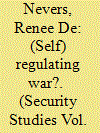

|
|
|
|
|
| Publication |
2009.
|
| Summary/Abstract |
Private security companies' growing participation in U.S. and international military missions has raised concern about whether the private security industry is subject to sufficient controls. Industry self-regulation is often proposed as part of a multilayered framework of regulations to govern PSCs. But what can self-regulation contribute to regulation of the private security industry? This matters because privatization in the security realm has moved beyond understandings of the proper breakdown of public and private functions concerning the use of force. This article assesses what self-regulation can contribute to the control of this industry and whether the private security industry lends itself to effective self-regulation. It concludes that the private security industry does not exhibit the capacity to adopt and implement effective self-regulation on its own. If self-regulation is to complement state and international regulation, participation in the design and oversight of self-regulation must be broadened beyond private security companies alone.
|
|
|
|
|
|
|
|
|
|
|
|
|
|
|
|
| 3 |
ID:
006795


|
|
|
|
|
| Publication |
New Delhi, Lancer Publichers, 1996.
|
| Description |
x, 203p.
|
| Standard Number |
18978292248
|
|
|
|
|
|
|
|
|
|
|
|
Copies: C:1/I:0,R:0,Q:0
Circulation
| Accession# | Call# | Current Location | Status | Policy | Location |
| 038641 | 355.02/KAM 038641 | Main | On Shelf | General | |
|
|
|
|
| 4 |
ID:
125066
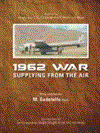

|
|
|
|
|
| Publication |
New Delhi, KW Publishers Pvt Ltd, 2012.
|
| Description |
xxii, 128p.Hbk
|
| Standard Number |
9789381904299
|
|
|
|
|
|
|
|
|
|
|
|
Copies: C:1/I:0,R:0,Q:0
Circulation
| Accession# | Call# | Current Location | Status | Policy | Location |
| 057482 | 954.04/SAD 057482 | Main | On Shelf | General | |
|
|
|
|
| 5 |
ID:
123353
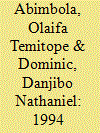

|
|
|
| 6 |
ID:
106148
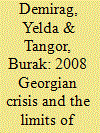

|
|
|
| 7 |
ID:
086828
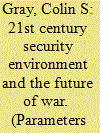

|
|
|
|
|
| Publication |
2009.
|
| Summary/Abstract |
Defence planning needs to be based on political guidance, and taht guidance should make its assumptions explicit. Sometimes we neglect this, and oversight can prove costly. Conditions, which is to say contexts, can change, and so shold the working assumptions behind policy.
|
|
|
|
|
|
|
|
|
|
|
|
|
|
|
|
| 8 |
ID:
122684


|
|
|
|
|
| Publication |
2012.
|
| Summary/Abstract |
The role of USA in modern warfare has rapidly changed over the pats few years. Armed forces would wide are beginning to explore the possibilities offered by unmanned vehicles (UV) especially with respect to both sensors and weapons. The operational capabilities of UV are now demonstrated in accordance with the capability profiles. It should be noted that regardless in whatever capability category a UAS is used, a commander is always required to judge mission success under the aspect of mission accomplishment and survivability. UAS are not yet to be regarded as one way systems.
|
|
|
|
|
|
|
|
|
|
|
|
|
|
|
|
| 9 |
ID:
084728
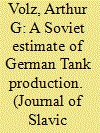

|
|
|
| 10 |
ID:
062685
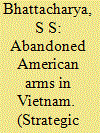

|
|
|
| 11 |
ID:
128568
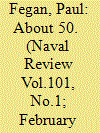

|
|
|
|
|
| Publication |
2013.
|
| Summary/Abstract |
In a series of articles, the author takes a look at cuts, cost and affordability in order to speculate about what could have been and what might be.
|
|
|
|
|
|
|
|
|
|
|
|
|
|
|
|
| 12 |
ID:
126736
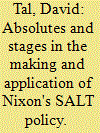

|
|
|
|
|
| Publication |
2013.
|
| Summary/Abstract |
President Richard Nixon and his National Security Adviser, Henry Kissinger took great pride in their success to achieve agreements on the limitation of Anti Ballistic Missiles and the Interim Agreement on Strategic Missiles with the Soviet Union. For Nixon, this agreement was not only an achievement that had been denied to his predecessor, it also seemingly represented the success of his own approach over that of his predecessors. Nixon-in tandem with Kissinger-intended to link arms control negotiations with the Soviet Union to the resolution of other political problems such as Vietnam, the Mideast, and Berlin. Through the employment of linkage, they hoped to make U.S. arms control policy part of Détente. However, Nixon was able to sign the "historic agreements" because his policy of linkage had in fact failed. It failed mainly because it was based on flawed assumptions and false premises. Thus, the historic success was possible precisely because Nixon had not actually made his arms control policy "distinct" from that of the Johnson Administration and its predecessors in his approach to strategic arms talks with the Soviet Union
|
|
|
|
|
|
|
|
|
|
|
|
|
|
|
|
| 13 |
ID:
102471


|
|
|
|
|
| Publication |
Lanham, Lexington Books, 2010.
|
| Description |
xvi, 254p.
|
| Standard Number |
9780739142516, hbk
|
|
|
|
|
|
|
|
|
|
|
|
Copies: C:1/I:0,R:0,Q:0
Circulation
| Accession# | Call# | Current Location | Status | Policy | Location |
| 055846 | 327.1170973/POD 055846 | Main | On Shelf | General | |
|
|
|
|
| 14 |
ID:
036808
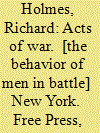

|
|
|
|
|
| Publication |
New York, Free Press, 1985.
|
| Description |
xii, 436p.
|
| Standard Number |
0029148510
|
|
|
|
|
|
|
|
|
|
|
|
Copies: C:1/I:0,R:0,Q:0
Circulation
| Accession# | Call# | Current Location | Status | Policy | Location |
| 032881 | 306.27/HOL 032881 | Main | On Shelf | General | |
|
|
|
|
| 15 |
ID:
096988
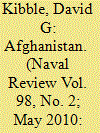

|
|
|
| 16 |
ID:
104786
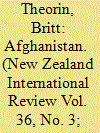

|
|
|
| 17 |
ID:
125283
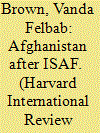

|
|
|
|
|
| Publication |
2013.
|
| Summary/Abstract |
Summer 2013 brought one of the most violent fighting seasons in Afghanistan since the US military and state-building effort began in 2001. On the cusp of the momentous 2014 presidential elections and a year before the majority of international coalition forces would depart from the country in the midst of transferring security functions to the coalition-supported Afghan National Security Forces (ANSF), the Taliban is dug in and still ferocious. It is testing the Afghan security forces, which since June 2013 are supposed to be taking the lead in providing security throughout the country while international forces are increasingly disengaging from combat and departing Afghanistan.
|
|
|
|
|
|
|
|
|
|
|
|
|
|
|
|
| 18 |
ID:
093811
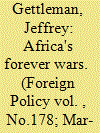

|
|
|
| 19 |
ID:
151087
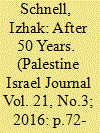

|
|
|
|
|
| Summary/Abstract |
The Israeli-Palestinian conflict is a dispute between two national movements claiming the same territory. It has been ongoing for over a hundred years, passing through different phases. In this respect, the 1967 Six-Day War signified the beginning of a new stage in the conflict in which relations between the occupied and the occupier have come to play a formative role in Israeli reality and be a primary factor in the construction of Israeli society. Since 1967 Israel has occupied Palestinian territories, and the Palestinian population has been living under occupation for almost five decades. In the summer of 2005, Israel withdrew unilaterally from the Gaza Strip and from four settlements on the West Bank, nevertheless continuing to control many aspects of life in Gaza (via border controls, blockades and other restrictions).
|
|
|
|
|
|
|
|
|
|
|
|
|
|
|
|
| 20 |
ID:
106796
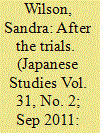

|
|
|
|
|
| Publication |
2011.
|
| Summary/Abstract |
'Lesser' Japanese war criminals, or those in Classes 'B' and 'C', were prosecuted by the various Allied powers in courtrooms around Asia after the Second World War. They were then executed or imprisoned in the places in which they had been tried. By the end of 1953, however, all surviving prisoners had been repatriated to Japan to serve out the remainder of their sentences, and by the end of 1958, all had been released. The decision to repatriate or release prisoners was made by the governments that had tried the war criminals, even after Japan regained its sovereignty in 1952, since the San Francisco Peace Treaty stipulated that the prosecuting countries retained the right to decide on any variation of the prisoners' sentences. The fate of convicted war criminals, therefore, was subject to diplomatic negotiation between Japan and the original prosecuting countries. These negotiations played an important role in the post-war reconfiguration of international relations in the East Asian region. Discussion about the repatriation and release of prisoners constituted one of the first topics of major international negotiation among a reconstructing Japan, the newly independent or decolonising nations of the region, the departing European imperial powers, a United States which was in the process of defining its Cold War aims in the region, and Australian governments seeking to establish a new foreign policy stance in the post-war world.
|
|
|
|
|
|
|
|
|
|
|
|
|
|
|
|